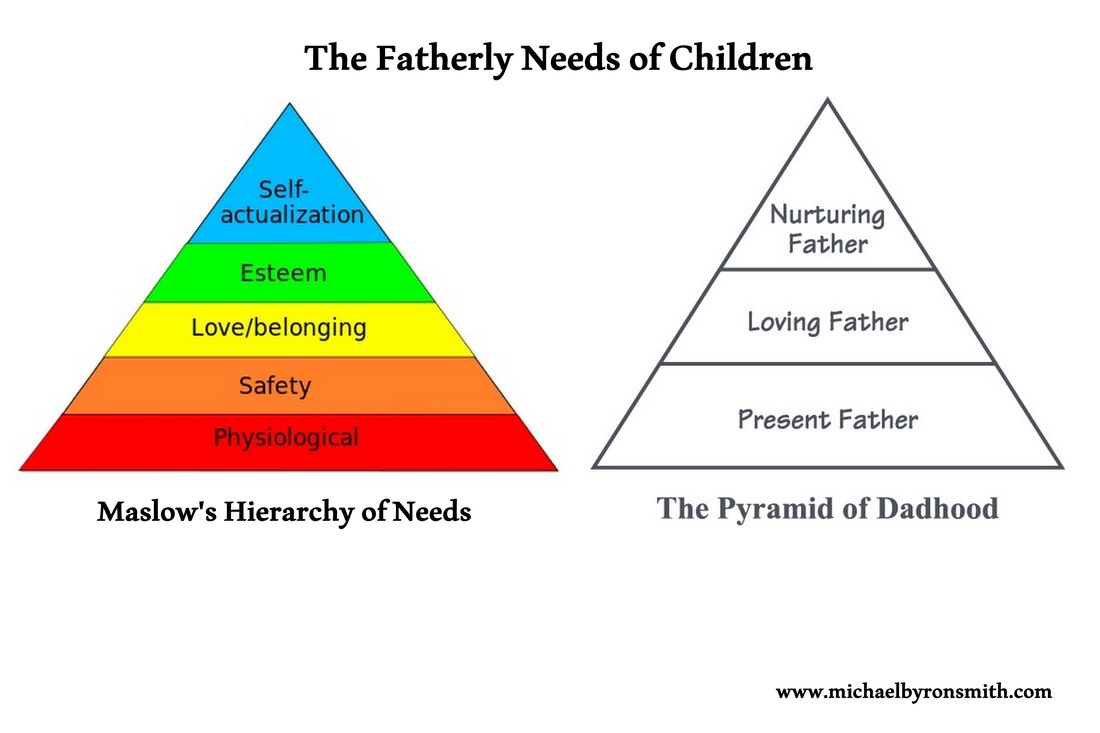Maslow's Hierarchy of Needs and the Role of Fathers
1. Biological and Physiological needs - air, food, drink, shelter, warmth, sex, sleep.
A father begins his responsibilities at this basic level, but he has to be present. He has the primary duty and ability to provide food, drink, shelter, and warmth. Of course others can provide the needs at this level--but who better than the father (with the mother) should do this?
2. Safety needs - protection from elements, security, order, law, stability, freedom from fear.
A father adds to his family responsibilities at the safety level. A basic responsibility of a man is to protect his family, to work with the mother to create order, to allow his children to grow without fear.
3. Love and belongingness needs - friendship, intimacy, affection and love, - from work group, family, friends, romantic relationships.
Fatherly love and acceptance is a base need of every human being. When it is missing, the consequences are revealed in many ways, from emotional suffering and greater challenges to succeed, to mental instability, crime and teen aged mothers.
4. Esteem needs - achievement, mastery, independence, status, dominance, prestige, self-respect, respect from others.
A nurturing father teaches and guides his offspring. His involvement is a crucial aspect in his children's success, pushing them, encouraging and challenging them. Kids with involved fathers have, in general, more confidence, higher goals, better educations, and the knowledge that someone very important to them is cheering for them and wants them to succeed.
5. Self-Actualization needs - realizing personal potential, self-fulfillment, seeking personal growth and peak experiences.
Too few of us ever get to fulfill the self-actualization level of Maslow' s needs. But far fewer will reach it without two parents in their lives. Two parents are essential in every step to get to self-actualization. Of course, any individual can waste the advantages of his/her life, just as those without these advantages can become self-actualized. But this is not about the extremes of performance, it is about the helping the vast majority in between who will rise with, or fall without, the help of two parents. And when one parent is missing, 90% of the time it is the father.
From "The Power of Dadhood" (click to order)
"Fathering styles can range from being totally out of the picture to being a controlling tyrant. We want a father to be around, but not in the way. We want him to be loving, but not overprotective. We want to learn from him, but not if he’s teaching a lack of values and self-respect.
So to be an effective father means to understand the need for balance and to have solid principles. That’s not too much to ask, but it is a tough assignment to deliver because the father has to be present, physically and emotionally, while also providing for his family.
THE PYRAMID OF DADHOOD (see above)
The Pyramid of Dadhood shows a hierarchy of traits needed for effective fathering. The foundation of the pyramid is for a father to be present in a child’s life, a necessary place to start and an immediate and immeasurable benefit to all involved.
At the next level of the pyramid, a father expresses love for his children and provides for their safety and comfort. When he achieves or naturally acts from this level, it is a colossal benefit to his children and lays the foundation for the pyramid’s pinnacle, where the father teaches, nurtures, and prepares his children for life. This hierarchy will be discussed in detail in future chapters.
Challenges do exist within each step and among all involved. None of this responsibility comes easily. If it did, the need for more fathers actually fathering would not be so great.
The missing father does not act within this pyramid. We can only discuss why he may be absent and the implications of his absence as they impact his children and our society, which we will do in chapter 2."
Being in The Pyramid is a good thing. Rising to the top is much better! I believe the very best parents have a goal of doing all they can to help their children become self-actualized. Read the characteristics of a self-actualized person described by Abraham Maslow and think about your children having these characteristics.
Characteristics of self-actualizers: (By studying 18 people he considered to be self-actualized (including Abraham Lincoln and Albert Einstein) Maslow (1970) identified 15 characteristics of a self-actualized person.)
1. They perceive reality efficiently and can tolerate uncertainty;
2. Accept themselves and others for what they are;
3. Spontaneous in thought and action;
4. Problem-centered (not self-centered);
5. Unusual sense of humor;
6. Able to look at life objectively;
7. Highly creative;
8. Resistant to enculturation, but not purposely unconventional;
9. Concerned for the welfare of humanity;
10. Capable of deep appreciation of basic life-experience;
11. Establish deep satisfying interpersonal relationships with a few people;
12. Peak experiences;
13. Need for privacy;
14. Democratic attitudes;
15. Strong moral/ethical standards.
These are truly worthwhile goals for anyone!
http://www.simplypsychology.org/maslow.html






